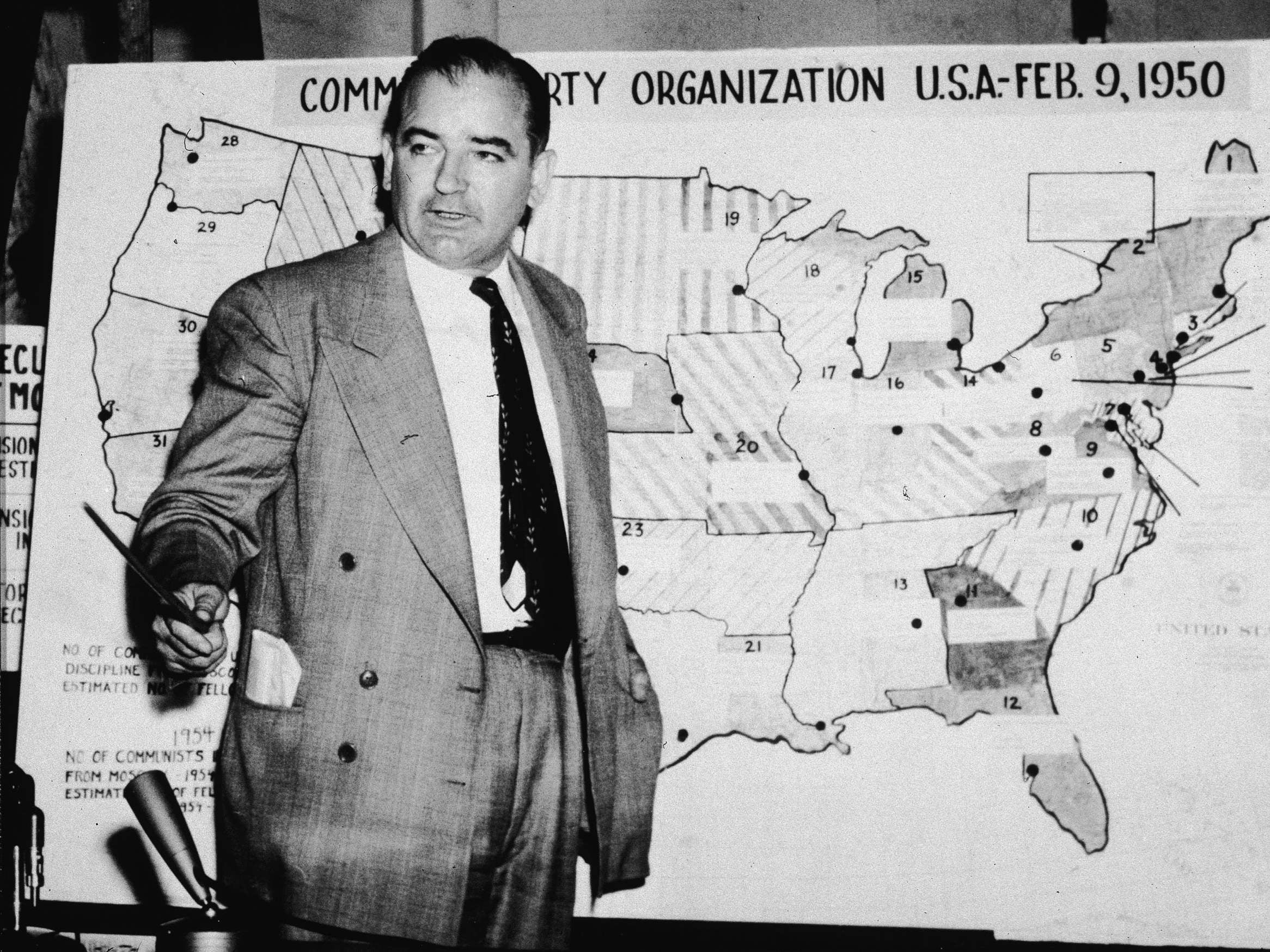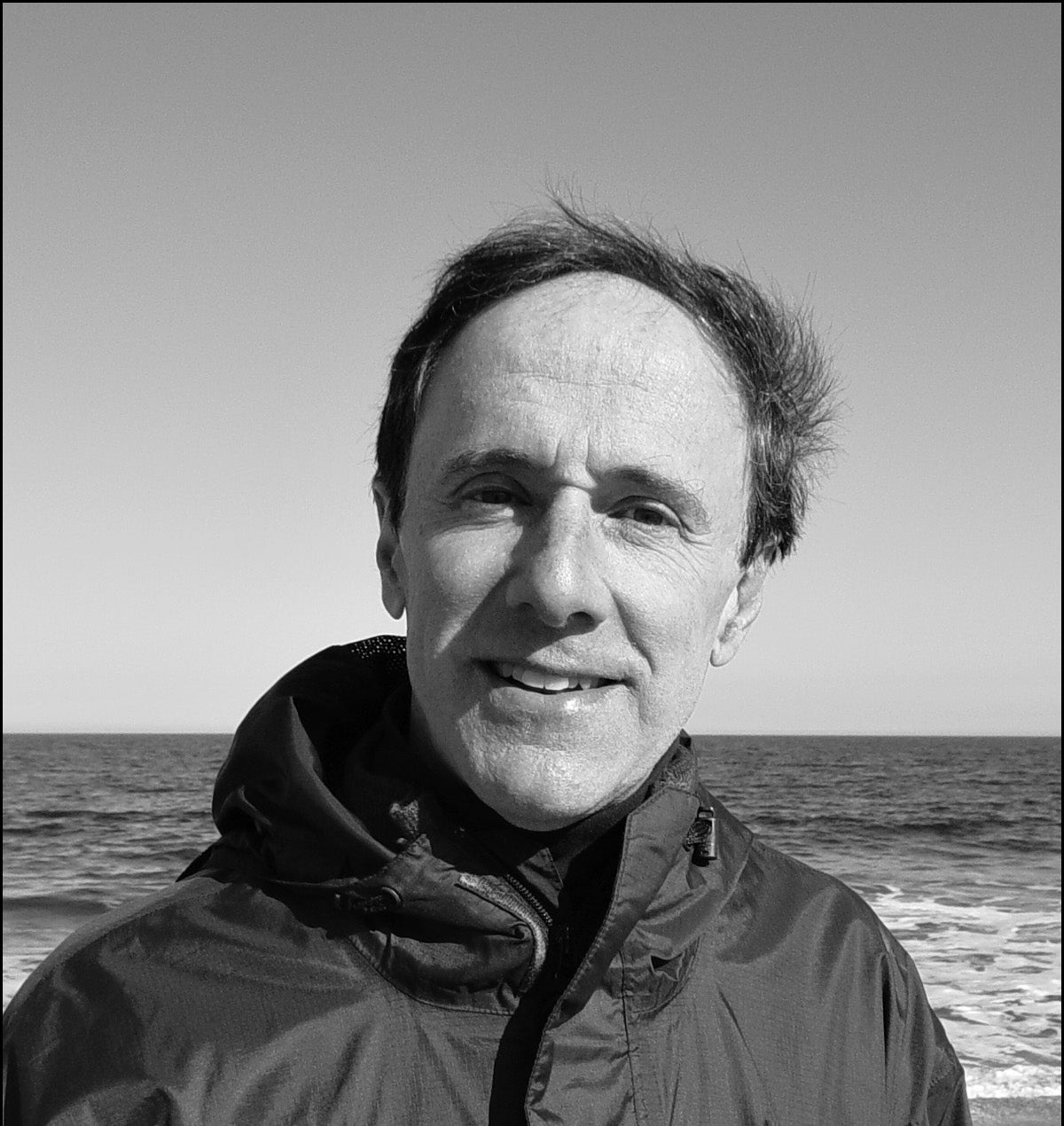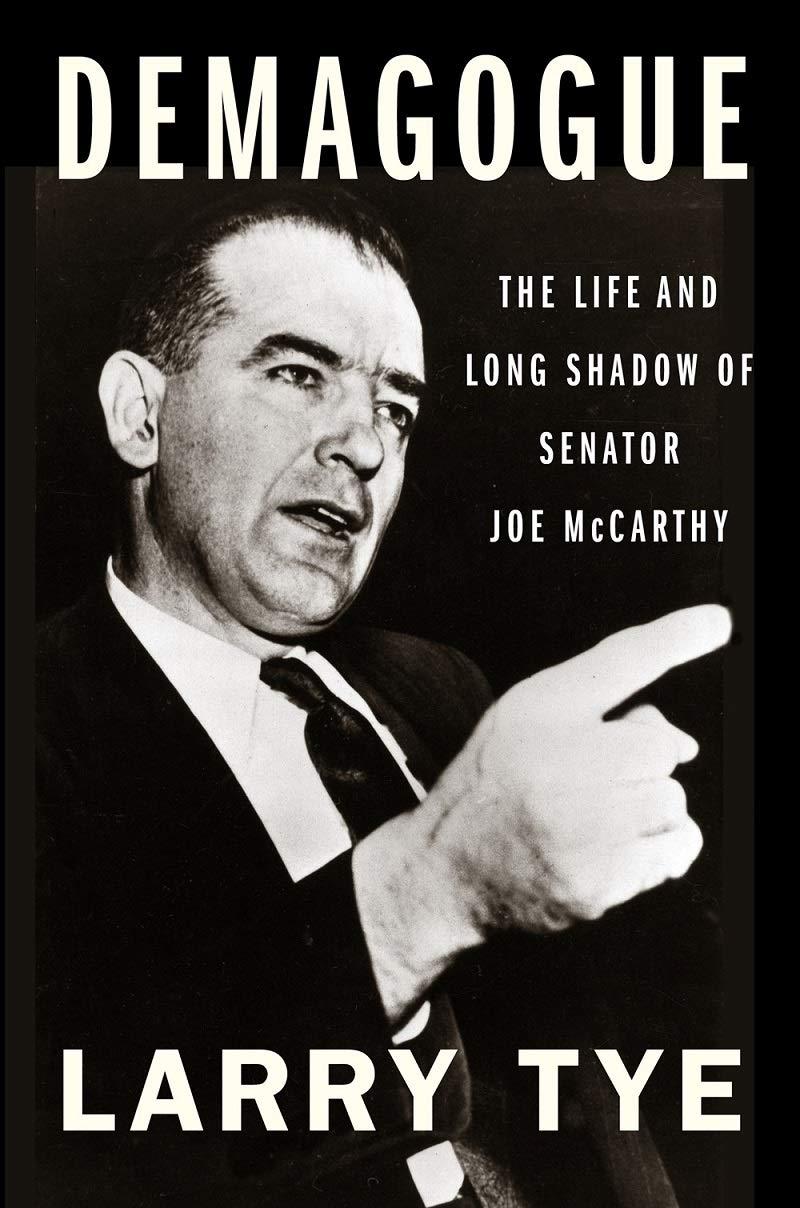‘Demagogue’: Book remembers McCarthy and his troublesome communist hunt
The word McCarthyism brings to the mind a dark moment in American history. A new book draws parallels with the Trump era, writes John Williams in a Q&A with the author

Your support helps us to tell the story
From reproductive rights to climate change to Big Tech, The Independent is on the ground when the story is developing. Whether it's investigating the financials of Elon Musk's pro-Trump PAC or producing our latest documentary, 'The A Word', which shines a light on the American women fighting for reproductive rights, we know how important it is to parse out the facts from the messaging.
At such a critical moment in US history, we need reporters on the ground. Your donation allows us to keep sending journalists to speak to both sides of the story.
The Independent is trusted by Americans across the entire political spectrum. And unlike many other quality news outlets, we choose not to lock Americans out of our reporting and analysis with paywalls. We believe quality journalism should be available to everyone, paid for by those who can afford it.
Your support makes all the difference.“It’s not often that a man’s name becomes an ism,” Larry Tye writes in his new biography of Joseph McCarthy, the senator from Wisconsin whose crusade against communism ensured that his name would endure as “a synonym for reckless accusation, guilt by association, fear-mongering and political double-dealing”. Tye writes in his preface that while the book focuses on McCarthy’s life, it’s also about a particularly American strain of demagogy that has existed from the country’s earliest days to Huey Long to George Wallace to the “astonishing ascension of President Donald J Trump.” Below, Tye discusses McCarthy’s fanaticism, his enablers, his military experience and more.
This interview has been condensed and edited.
Q: When did you first get the idea to write this book?
A: I first thought about it when I was writing my last book, which was a biography of Bobby Kennedy. Joe McCarthy gave Bobby his first real job, and they became fast friends. Bobby’s widow, Ethel, told me that the public might have thought McCarthy was a “monster”, but he was “just plain fun”. Those are words you don’t normally associate with Joe McCarthy, so they made me curious.
Just before the 2016 election, I had assumed that even a groundbreaking bio of McCarthy, if I could write something like that, might seem like a chapter of American history that was too painful to revisit, and one that we might have outgrown. And after the election, it was pretty clear we hadn’t.
Q: What’s the most surprising thing you learnt while writing it?
A: I knew there was a general link between McCarthy and Trump, but I didn’t realise how eerily echoing it was. I had exclusive access to all of McCarthy’s professional and personal papers. And in secret transcripts of closed-door hearings, I realised that if you crossed out McCarthy’s name, you would think you were listening to our 45th president.
In 2016, Trump famously boasted: “I could stand in the middle of Fifth Avenue and shoot somebody, and I wouldn’t lose any voters.” Where did he get that idea? Well, exactly 62 years before, George Gallup, the polling pioneer, wrote something chillingly similar about McCarthy’s supporters: “Even if it were known that McCarthy had killed five innocent children, they would probably still go along with him.”

The press had dismissed the idea of him as a legitimate war hero. They made fun of the moniker he gave himself, Tail Gunner Joe. It turns out, from the handwritten notes in the files and from his comrades in the marines, that he volunteered for dangerous missions that he didn’t have to fly, and he was, to his credit, a war hero.
And the most famous speech he ever gave – the one that launched his crusade – was in Wheeling, West Virginia. It turns out that he showed up that day with two speeches in his briefcase: one was a snoozer about national housing policy, which he happened to know something about. The other was this barn-burner about communists and the government. If he had given that first one, you and I might not be talking about this today.
Q: In what way is the book you wrote different from the book you set out to write?
My book is the story of America’s love affair with bullies. But it’s also a heartening story when we’re desperate for one
A: I set out to write more of a finger-pointing screed about McCarthy and the demagogues who came before and after him. But I ended up being at least as fascinated by their enablers. In his case, that meant the Texas oilmen who were his biggest bankers, the journalists who acted as his megaphone and bureaucrats like the FBI’s J Edgar Hoover. In the personal papers, I kept seeing secrets that Hoover and FBI folks had leaked to McCarthy. And there was President Eisenhower, who was the one person who could have taken down the bully before he wrecked so many people’s lives, but instead became his enabler-in-chief. Worst of all, in my mind, it was all of us, who for four and a half years bought McCarthy’s fraudulent crusade and made him the second most popular figure in America, just behind Ike.
Almost from the start of his presidency, Eisenhower’s brother Milton was whispering in his ear, saying: “Give up some of your popularity and take on this guy.” And instead Eisenhower used what historians – who I think have given him an undue free pass on this – call the “hidden hand”, where he might look like your grandfather and like all he wanted to do was go out and play golf, but behind the scenes he was orchestrating things. His waiting for McCarthy to self-destruct, to go one step too far, would have been OK if McCarthy hadn’t been ruining people’s careers and forcing a handful of people, at least, to kill themselves. And behind the scenes, Eisenhower was telling his staff and his brother and his friends that he knew just how dangerous McCarthy was.

When Eisenhower was running for office, he had a speech he was ready to give defending his great buddy George Marshall against McCarthy’s charges; that he was part of a vast conspiracy. But he scrapped it. I’m convinced, with very little evidence, that this is one of the few things in his life that Eisenhower ever regretted. He was too savvy a guy not to realise that his brother had been right.
Q: Who is a creative person (not a writer) who has influenced you and your work?
A: My hero was somebody who lived half of his life in disguise and the other half as the world’s most recognisable man, and who had the innocence and confidence to appear in public wearing underwear over body tights. That was the Man of Steel, Superman. I loved him enough to write a biography of him, and what I love is that, like me, he’s Jewish, made consciously so by the two Jewish kids from Cleveland who invented him. I love that he gave hope to nerdy kids like me, that if only people looked hard enough they’d see that we have a hero in us. As I was telling this McCarthy story, about America’s archetypal demagogue, I kept my perspective by harking back to this archetype of mankind at its pinnacle and its best. And lastly, Superman makes me feel like I’m 10 years old again.
Q: Persuade someone to read ‘Demagogue’ in 50 words or less
A: My book is the story of America’s love affair with bullies. But it’s also a heartening story when we’re desperate for one. The lesson of Joe McCarthy and our other demagogues is that they fell even faster than they rose.
‘Demagogue The Life and Long Shadow of Senator Joseph McCarthy’ by Larry Tye, out in the UK on 16 August 16, Houghton Mifflin Harcourt, £28.14.
© New York Times
Join our commenting forum
Join thought-provoking conversations, follow other Independent readers and see their replies
Comments